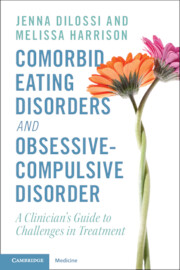 Comorbid Eating Disorders and Obsessive-Compulsive Disorder
Comorbid Eating Disorders and Obsessive-Compulsive Disorder Book contents
- Comorbid Eating Disorders and Obsessive-Compulsive Disorder
- Comorbid Eating Disorders and Obsessive-Compulsive Disorder
- Copyright page
- Contents
- Foreword
- Preface
- Acknowledgments
- Abbreviations
- Part I Overview of the Existing Literature
- Part II Clinical Pitfalls and Treatment Failures
- Part III Evidence-Informed Considerations for Assessment and Treatment
- Chapter 14 Thorough Assessment
- Chapter 15 Collaborative Conceptualization and Treatment Planning
- Chapter 16 Navigating Meal Planning
- Chapter 17 Navigating Self-Monitoring
- Chapter 18 Navigating the Scale & weighing
- Chapter 19 Navigating Body Image
- Part IV Special Topics and Future Considerations
- References
- Index
Chapter 16 - Navigating Meal Planning
from Part III - Evidence-Informed Considerations for Assessment and Treatment
Published online by Cambridge University Press: 14 December 2023
- Comorbid Eating Disorders and Obsessive-Compulsive Disorder
- Comorbid Eating Disorders and Obsessive-Compulsive Disorder
- Copyright page
- Contents
- Foreword
- Preface
- Acknowledgments
- Abbreviations
- Part I Overview of the Existing Literature
- Part II Clinical Pitfalls and Treatment Failures
- Part III Evidence-Informed Considerations for Assessment and Treatment
- Chapter 14 Thorough Assessment
- Chapter 15 Collaborative Conceptualization and Treatment Planning
- Chapter 16 Navigating Meal Planning
- Chapter 17 Navigating Self-Monitoring
- Chapter 18 Navigating the Scale & weighing
- Chapter 19 Navigating Body Image
- Part IV Special Topics and Future Considerations
- References
- Index
Summary
Treating comorbid obsessive-compulsive disorder and eating disorders can be complex as OCD symptoms such as rigidity, perfectionism, and reassurance seeking can disrupt typical ED interventions such as meal planning. Additionally, the content of a patient’s obsessions in OCD can shift to different categories in their life, including ED recovery (e.g., intrusive thoughts that they are going to relapse). To address the challenges of treating comorbid OCD and EDs, it is important to promote flexibility in various aspects of meal planning such as incorporating a variety of foods, being flexible with meal times, meal prepping, and promoting mindfulness and self-compassion. Cognitive techniques such as cognitive restructuring can be used to help patients identify and challenge rigid and perfectionistic thinking. Gradual exposure to flexibility can also be used to help patients learn to tolerate and manage their anxiety. A collaborative approach involving patients in the meal-planning process can also be helpful in reducing rigidity and promoting a more active role in decision-making.
- Type
- Chapter
- Information
- Comorbid Eating Disorders and Obsessive-Compulsive DisorderA Clinician's Guide to Challenges in Treatment, pp. 107 - 115Publisher: Cambridge University PressPrint publication year: 2023
